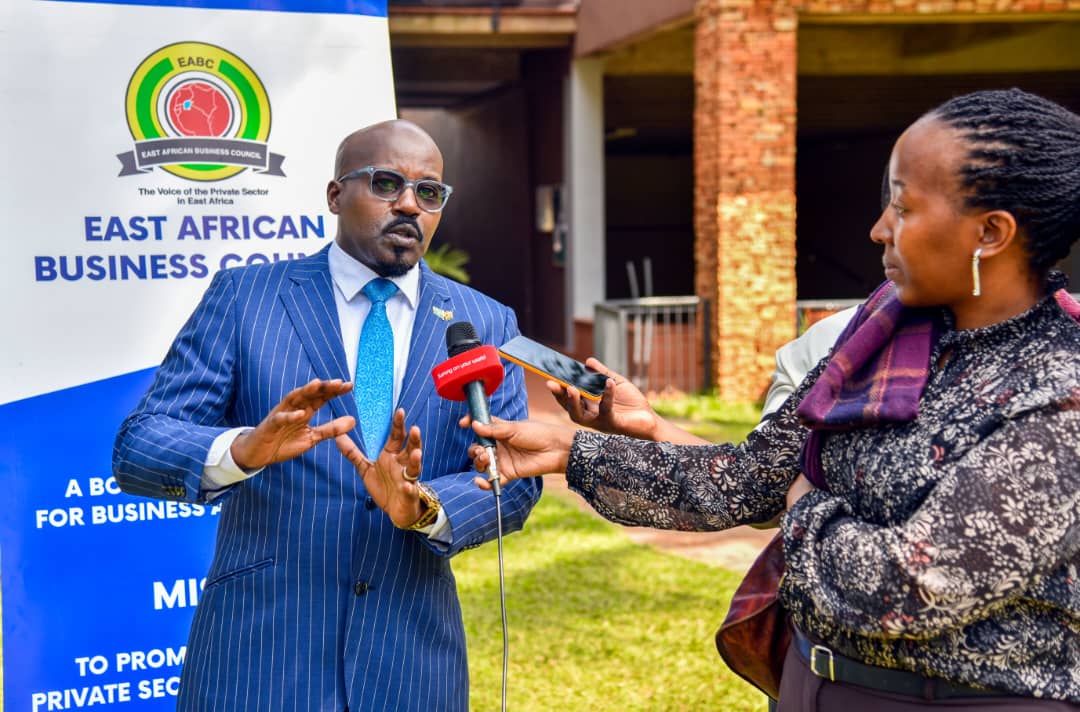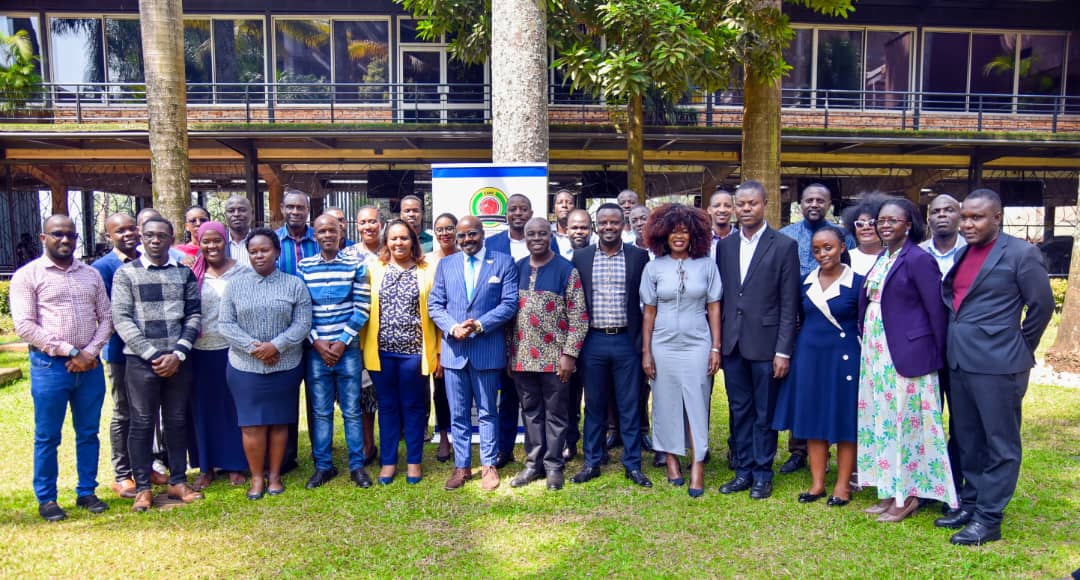Kampala, Uganda – The East African Business Council (EABC) has convened a consultative meeting in Uganda to discuss the development of a regional services policy.
The meeting, which took place at Kabira Country Club from February 24-25, 2025, aimed to strengthen trade and investment in services across the East African Community (EAC). It brought together key stakeholders from various sectors to identify challenges and opportunities.
The meeting was officially opened by Oscar Kamukama, Uganda Representative and Director on the EABC Board in Arusha, who emphasized the critical role of the services sector in driving economic growth.
“The services sector is the engine of our economies, contributing between 40% to 55% of the EAC’s GDP. Yet, despite its potential, regulatory barriers and market fragmentation continue to hinder its growth. This consultative meeting provides a platform to identify and address these challenges, develop a SMART (Specific, Measurable, Achievable, Relevant, Time-bound) Regional Services Policy Advocacy Agenda, and propose a structured institutional mechanism for sustained dialogue between the private sector and policymakers,” Kamukama stated.

Following the opening remarks, the meeting featured a presentation by Ms. Nderitu Agatha, a Managing Director, ATEAS Ltd and an independent senior consultant from Nairobi, Kenya, with over 20 years of practical experience working with both the private and public sectors.
She provided key insights into the impact and growth of the services sector.
“Services drive economic growth, and in Uganda, services output has been growing at a rate of 6.2% since 2023. The services sector is also a major employer, with Uganda ranking second at 66.3% employment in services, following Burundi at 85.1%. Furthermore, services contribute positively to female employment, with an increasing number of women engaged in commercial services between 2011 and 2019. Despite a decline in service delivery due to the COVID-19 pandemic, the sector rebounded with a 22% growth in 2022,” Agatha highlighted.
She also noted significant drivers of trade in East Africa, particularly in ICT, which has experienced a 375% growth, generating 3.82 trillion in revenue by 2022 and accounting for 54% of total global exports. Key sectors such as telecoms, computer and information services have shown the fastest annual growth, alongside traditional sectors like transport and construction.

In addition, Agatha underscored the role of services in boosting manufacturing and exports, attracting foreign direct investment (FDI), and contributing to Sustainable Development Goals (SDGs) through essential services like healthcare, education, and financial inclusion.
The consultative meeting was attended by a diverse group of stakeholders, including representatives from the IT sector, the business community such as Steel and Tube, Movit, the media, and many others. The discussions aimed to build a cohesive advocacy agenda that ensures the private sector plays a significant role in shaping policies for a more integrated and competitive regional services market.

Stakeholder Concerns and Proposed Solutions
During the discussions, stakeholders voiced their concerns and proposed potential solutions to enhance the regional trade environment. Key issues raised included:
Traffic Regulations: Mr. Isaac Katabazi from Transport and Logistics emphasized the need for harmonized traffic regulations across East Africa to streamline movement and logistics.
High Cost of Road Freight: The variation in fuel prices, particularly between Uganda and South Sudan, was cited as a major challenge. Additionally, the high cost of tyres in Uganda compared to Sudan was noted as a concern.
Border Delays and Checkpoints: Katabazi highlighted inefficiencies at the Malaba border, where three checkpoints on the Ugandan side cause unnecessary delays, impacting trade flow.
Unprofessional Border Staff: Issues were raised regarding the conduct of staff at key border points, especially in Uganda at Katuna and Malaba, affecting efficiency and business operations.
Excessive Taxation and Infrastructure Gaps: Stakeholders called for a review of taxation policies and improvements in essential facilities such as parking spaces, toilets, and washrooms at border points.
National ID Acceptance: A major challenge was raised regarding Tanzania’s non-acceptance of national IDs from other East African countries, limiting seamless movement within the region.

Poor Road Conditions: The state of roads, particularly in Congo and South Sudan, was a major impediment to trade and logistics.
Political Instability: Ongoing instability in Congo and South Sudan was highlighted as a significant barrier to economic growth and regional trade.
Corruption: Concerns were raised about corruption among officials across East African countries, which continues to hamper smooth business operations.
Media and ICT Challenges & Solutions
Co-founder DirtTrails safaris
Founder metamind
Computer science student and Researcher at Makerere university
George Ssemaganda Co-founder DirtTrails Safaris|Founder metamind, Computer science student and Researcher at Makerere university, pointed out several challenges faced by the media and ICT sectors in East Africa, including:
Limited Sensitization on EAC Projects: Businesses and the public lack awareness of regional initiatives, affecting participation and digital transformation.
State Interference in Journalists’ Freedom & Digital Rights: Restrictive laws, internet shutdowns, and surveillance curb press freedom and investigative journalism.
Digital Trade Challenges: Regulatory inconsistencies, high taxation, and internet costs hinder cross-border e-commerce and digital trade.
Lack of Investment in Public-Private-Owned (PBO) Infrastructure: Limited funding for broadband expansion and data centers affects digital access and innovation.
Cross-Border Communication Restrictions: High roaming charges, telecom regulation differences, and digital transaction barriers impede trade and connectivity.
Proposed ICT & Media Solutions:
Develop Common ICT & Digital Trade Policies: Harmonize digital laws and e-commerce regulations to facilitate seamless trade.
Increase Awareness & Sensitization on EAC Digital Projects: Utilize media campaigns and training programs to educate businesses and individuals.
Encourage Digital Trade & Reduce Tax Barriers: Lower taxation on digital services and improve cross-border e-commerce platforms.
Boost ICT Infrastructure Investment: Partner with governments and investors to expand fiber-optic networks and 5G connectivity.
Eliminate Communication Restrictions: Advocate for affordable cross-border mobile services and remove roaming charges.
Fund Startups & Digital Innovations: Establish innovation hubs and tech grants to support local entrepreneurs.
Promote AI, Robotics & Machine Learning Development: Invest in AI research and local tech production.
Teach Digital Entrepreneurship: Introduce ICT business training in schools and universities.

Tourism & Hospitality Sector Challenges and Solutions, with EABC Support
The tourism and hospitality sector, raised critical concerns about challenges facing the industry and urged the East African Business Council (EABC) to advocate for policies that enhance the sector’s growth, sustainability, and competitiveness.
Key Concerns & Recommended Solutions
1. Adoption of a Unified East African Tourism Visa
A single East African Tourism Visa (EATV) across all EAC member states would boost regional tourism by allowing seamless movement of tourists across borders. Currently, only Kenya, Uganda, and Rwanda offer a joint visa. Expanding it to all EAC countries would:
- Attract more international visitors.
- Increase regional tourism revenue.
- Reduce bureaucracy and visa processing costs.
- Encourage multi-country tourism packages.
EABC Role:
- Advocate for EAC-wide adoption of the visa.
- Push for harmonized visa costs and digital application processes.
2. Reducing Costs for Tourism Operators
Tourism operators face high operational costs due to multiple licensing fees, expensive park entry charges, and fluctuating taxes. High transportation costs and airport landing fees discourage international airlines from adding more regional routes.
- EABC Role:
- Advocate for reduced licensing fees & streamlined permit processes.
- Push for lowered park fees & harmonized tourism levies across EAC states.
- Negotiate with aviation regulators to reduce landing fees and encourage more direct flights.
3. Addressing the Shortage of Certified Tour Guides
The region lacks trained and certified tour guides, affecting service quality. Many guides operate without formal training, leading to unprofessional experiences for tourists.
EABC Role:
- Partner with tourism boards to introduce standardized certification programs.
- Promote scholarships & training programs for young people in the tourism sector.
4. Joint Marketing Strategies to Boost Regional Tourism
- Lack of unified branding and marketing leads to competition between EAC countries rather than a collaborative approach to attract global tourists.
EABC Role:
- Develop an East Africa Tourism Branding Strategy to promote the region as a single destination.
- Organize joint tourism fairs and international expos to showcase EAC’s diverse attractions.
- Strengthen digital marketing campaigns targeting global tourists.

5. Enhancing Digital Transformation in Tourism
Tourism operators have limited digital presence, reducing global visibility. There is slow adoption of AI, virtual tours, and digital booking systems in the industry.
EABC Role:
- Advocate for investment in smart tourism platforms, including AI-powered travel assistants and virtual reality (VR) tours.
- Push for digitization of park and hotel bookings to streamline travel experiences.
- Encourage the use of blockchain for secure travel transactions.
6. Strengthening Security Protocols for Tourists
Safety concerns, including poaching, terrorism threats, and political instability, affect tourism numbers. Cross-border security coordination is weak, exposing tourists to risks.
EABC Role:
- Advocate for a regional tourist safety policy to enhance security measures.
- Work with governments to improve anti-poaching efforts and secure national parks.
- Promote tourism police training to ensure visitor safety.
7. Investing in Human Resource Management & Training
The tourism workforce lacks specialized training in customer service, hospitality management, and sustainable tourism. There is also a skills gap in digital tourism trends, including AI-driven customer service.
EABC Role:
- Establish tourism training hubs with updated curricula.
- Support internship and apprenticeship programs to improve workforce skills.
8. Sustainable Tourism & Conservation
Environmental degradation threatens wildlife, beaches, forests, and cultural heritage sites. Unregulated tourism leads to overcrowding and damage to natural attractions.
EABC Role:
- Promote eco-friendly tourism policies and strict environmental regulations.
- Encourage community-based tourism models that benefit local populations.
9. Financial Initiatives for Tourism Growth
Tourism businesses face limited access to affordable financing. High-interest rates prevent operators from expanding their services.
EABC Role:
- Push for low-interest tourism sector loans from banks and investors.
- Advocate for the creation of an EAC Tourism Development Fund.
10. Industry Reforms to Improve Competitiveness
Outdated tourism policies slow down investment. There is a need for better regulation and governance in tourism authorities.
EABC Role:
- Push for policy reviews and legal reforms to enhance tourism sector governance.
- Encourage ease of doing business reforms to attract investors.
11. Strengthening Public-Private Partnerships (PPPs)
Stronger collaboration between governments and private sector players is needed to improve tourism infrastructure and marketing.
EABC Role:
- Advocate for joint funding between governments and private investors for tourism projects.
- Encourage private sector involvement in conservation efforts.
12. Capacity Building for Small Tourism Businesses
Many small-scale operators lack access to training, mentorship, and funding.
EABC Role:
- Establish capacity-building programs for tour operators, hoteliers, and local travel agencies.
- Promote knowledge-sharing forums for small and medium-sized enterprises (SMEs) in tourism.
13. Tax Breaks to Attract More Investors
High taxation discourages both local and foreign investments in the sector. Expensive hotel construction costs limit expansion.
EABC Role:
- Push for tax incentives on tourism infrastructure development.
- Advocate for reduced import taxes on tourism-related equipment.
14. Enhancing Capital Flow into the Tourism Sector
Foreign direct investment (FDI) in tourism is lower than in other economic sectors. Bureaucratic barriers make it difficult for foreign investors to enter the industry.
EABC Role:
- Work with governments to simplify investment regulations.
- Encourage regional tourism investment forums to attract more capital.
15. Embracing Technology & Digital Platforms
The tourism sector needs greater adoption of technology to remain competitive.
EABC Role:
- Encourage mobile payment systems and digital booking platforms.
- Support AI-driven travel planning tools for tourists.
A representative from the tourism sector said by implementing these strategies, the EABC can help transform East Africa’s tourism and hospitality sector into a globally competitive and sustainable industry.
“A well-regulated, technologically advanced, and investment-friendly tourism landscape will boost regional economies, create jobs, and position East Africa as a top global travel destination,” she added.
The EABC pledged to collaborate with policymakers to implement these recommendations and foster a business-friendly environment within East Africa.
![]()






















